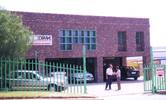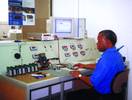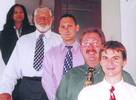
It is always encouraging to see local manufacturers thriving in the highly competitive instrumentation and control sector and here Digital Process Measurements (DPM) is most certainly setting an example that others in different fields could follow.
The history
DPM was the brainchild of Dave Howcroft and Franz Boshoff who had established Instrotech in 1981. They continue to run the latter highly successful business today with Dave as Managing and Franz as Financial Directors respectively. It was in 1989 that they recognised the opportunity to establish a local specialised manufacturing facility and they teamed up with designer Peter Krause to establish DPM as an independent entity. DPM took less than two months to get its production line up and running and within 12 months the company was the largest manufacturer of panel meters in the country, their success with this product line being indicated by the fact that within three years they had produced more than 20 000 units. These 'first generation' dumb instruments were replaced by a range of fully programmable panel meters from 1996 and new products and features have been continually introduced ever since.
Today in a typical month DPM turns out 600 microprocessor-controlled instruments, this just meeting current demands of the local and export markets. From the original range of digital panel meters the company now offers a total range of signal converters and load cell amplifiers with applications including weighing, temperature, frequency and timing (including count and totaliser functions). Apart from the standard LED digital display, a bar-graph option again using LEDs for the visible display is available. Displays are offered in normal size as well as extra large (for easy reading at up to 50 m) and in miniature form. One of the unique features of the entire product range is that they are designed to work with any sensor and all common interface protocols (including RS232 and RS485) are available as options.
Right from the start the partners in the new company realised that opportunities lay in not just satisfying the needs of local customers but getting into the increasingly lucrative export market. While our own industry is demanding, the global market defines a new set of rules for manufacturers and DPM has gone the extra mile to comply. The company achieved its Dekra ISO 9001 certification in 1996 (9001 includes the design function together with manufacture) and today every product is CE compliant. With a large market existing for their product range in Australia the plant and equipment is also audited to meet C4requirements.
The ongoing drive for quality and reliability has resulted in the company offering a minimum three-year warranty on all its products, and this has even been extended in the case of rare returns for repair when it was obvious that the fault was not due to misuse or wanton customer damage.
The partners recently decided to run the company in a more innovative way, this being through a management team approach that reports directly to the Board. According to Dave Howcroft this technique is working very effectively and will be continued for an indefinite period. As with Instrotech, DPM remains privately owned, in this case the shareholders being members of the Howcroft and Krause families. The success of the businesses is further in evidence through the fact that the controlling interest in the extensive modern built-for-purpose premises in Kya Sands is owned by the major shareholder.

Manufacturing
The full range of products offered by DPM are manufactured in-house at the modern premises in Kya Sands. The R&D team consists of two full time personnel who are assisted by two others on a part-time basis. Following design, PC boards are produced locally and populated with surface mount components by a sub-contractor. Power and other nonsurface mount components are added at DPM and the instrument is then assembled together with an LED or other display into a locally manufactured housing. All these novel 'clip-together' housings (no screws are used) were also designed by DPM and again are manufactured using local injection moulding facilities. DPM itself owns all the tools for these housings, and despite the high initial investment in tooling the company has found that local housing manufacture enhances their competitivity, particularly in the export market. As a rule of thumb the locally produced housings are a quarter of the price of a fully imported product. After initial assembly and testing every unit goes through a thermal soak before going through a final test at one of three computer-controlled test stations. From here the units are placed in storage before being drawn once more against an order for option configuration and calibration. As expected from an ISO 9001 company all in-house test equipment is calibrated on a regular basis using a SANAS-accredited calibration laboratory.
All the microprocessor-based units are built with the capability of having a large number of optional features. Although these are built in they are activated using a computer to meet the requirements of the specific customer. This is done on DPM's test stations as mentioned above, but should a customer want to power up other options in the field he can be provided with a 26-digit code number which will be specific to his particular instrument and will only activate the option on that unit. Selected options now feature plug-and-play technology allowing the specific option board to be ordered separately and fitted in the field when required.
By the way the philosophy at DPM is one of multiskilling and job rotation. Not only does this relieve manufacturing staff from the tedious repetitiveness of single product assembly, it allows for rapid redeployment of technical personnel to address bottlenecks in the production process. All of this results in a much higher productivity than is the South African norm.

Export business
Despite sanctions and other difficulties DPM entered the export business almost immediately and today this accounts for between 20 and 25% of turnover. What is really a remarkable achievement is the fact that DPM 'name brands' their products for some 13 other companies nationally and internationally. These companies include the highly respected Avery Berkel whose weighing products are sold throughout the world.
In terms of direct exports the two largest customers of DPM are the EC (particularly the UK, Netherlands and Germany) and Australia where sales are conducted through Instrotech Australia in Adelaide. Plans are also in place to tackle an even more difficult market, namely North America, and compliance with their specific requirements (such as UL) is not seen as a problem by DPM.
In order to keep abreast of technological trends (DPM actually prides itself on often pre-empting these) and to make its product line internationally visible the SA company regularly participates in overseas trade shows. Involvement in these exhibitions also allows the local company to retain close contact with its growing number of international distributors.

New developments
With its track record of successful innovation and export sales DPM is currently being supported financially by the DTI and the IDC to develop a completely new range of products. It is expected that these will be released later in 2001 and using this new product line with its many unique features DPM intends challenging the dominance in the global market of some really substantial brands. Having had a glimpse of the core product and the thinking behind it I believe that the local company may be on to a real winner which will extend their capability outside of their proven product range.
Some achievements
The achievements of DPM have been recognised in a number of ways and in 1997 it was recognised as a Standard Bank 'Technology Top 100' company of the year, becoming outright winner of its class in 1999. Even more prestigious was the award to DPM of the Electronic Industries Federation (EIF) Award for the best performing small or medium size company in the electronics and instrumentation sector in terms of growth, exports and innovation.
A final short anecdote revolves around the mice whose images you will find on the bottom right hand corner of the technical data sheets of DPM. The origin of these goes back to Peter Krause (now deceased) who had the habit of 'doodling' while deep in thought compiling the original data sheets. His design eventually went through for reproduction along with the tiny caricature of the mouse and it has become a company tradition to continue this unique branding.

© Technews Publishing (Pty) Ltd | All Rights Reserved